- Home
- Mark Lawrence
King of Thorns Page 10
King of Thorns Read online
Page 10
I see, but I can’t hear.
When I climb, and only then, on the very edge of everything, I catch stray notes. Like words robbed of meaning on the cusp of hearing…the music almost reaches me. And for that I would dare any height.
I made an eighth assault on the Spire at the start of the summer in which the Prince of Arrow crossed my borders with his armies new laden with loot from conquests in Normardy and Orlanth. Loot and, it must be said, recruits, for the lords of those lands were not well loved and the Prince won the people’s hearts almost before their dead were boxed and buried.
Climbing is about commitment. On the Spire there are places so sheer that one hold must be wholly relinquished before the next can be obtained, and sometimes then only by hurling yourself up an open expanse of rock that offers no purchase. In such moments you are falling, albeit upwards, and if the next hold escapes you then that fall will carry you to the ground. There are no half measures in such ascents: you place everything you are or will be on each decision. Lives can be lived in this manner, but I do not recommend it. In the end though, everybody dies, but not everybody lives—the climber, though he may die young, will have lived.
There comes a point on a long climb when you know you have to surrender or die. There’s no quarter given. I hung to cold stone fifty feet beneath the summit, weak as a child, aching with hunger, blistered hands and feet, arms screaming. The art of survival in the mountains is knowing when to give up. The art of reaching the top is knowing when not to.
“If I die here,” I whispered to the stone. “If I fall and die, I will count it a life lived, maybe not well, but fully. No book will know my end, but I will have died in battle none the less.” And summoning my strength I started to climb again.
Like the Scots king and his famous spider, my eighth attempt proved the charm.
Retching, slobbering on the rock, I crawled over the final corner, horizontal at long last. I lay trembling, gasping, half sobbing, as close to the end of my endurance as I had ever come.
When you’re climbing you take nothing with you that you do not absolutely need. That’s a good discipline to acquire, and the mountains teach it to you for free. They say that time is a great teacher but unfortunately it kills all its pupils. The mountains are also great teachers, and better still, they let the occasional star pupil live.
The mountains teach you to be prepared for change. Amongst the peaks the weather can shift from fair to foul quick as blinking. One moment you might be clambering up a forgiving slope and the next you could be clinging to it as though it were your mother, whilst an east wind tries to carry your frozen corpse off with it.
Climbing God’s Finger I learned a lot about holding on by my fingertips. By the time I finally hauled myself weak and trembling onto the very top of the spire, I had come to realize that I’ve been holding on by my fingertips my entire life.
I flopped to my back. I lay there on the rock with nothing to see between me and a relentless blue sky. I had climbed light, taking nothing unneeded with me, no room on that narrow peak for anyone else, ghosts or otherwise, no Katherine, no William, my mother and father four hundred feet below, too far away to hear. Not even the shadow of a child on the rock or the glimmer of a copper box in memory. It isn’t the danger or the challenge that keeps me climbing, it’s the purity and focus. When you’re a five-second drop from being a smear of guts and pulverized bone, when your whole weight is on eight fingers, then seven, then five, your choices are black and white, made on instinct without baggage.
When you climb hard and reach an impossible peak or ledge, you gain a new perspective, you see the world differently. It’s not just the angle you’re looking from that changes. You change too. They say you can’t go back, and I learned that when I returned to the Tall Castle after four years on the road. I walked the same halls, saw the same people, but I hadn’t gone back; I’d come to a new castle, seen with new eyes. The same is true if you climb high enough, only with climbing you don’t need to stay away for years. Climb a mountain, see the world from its highest point, and a new man will climb down to a world of subtle differences the next day.
Metaphysics aside, there is plenty to be seen from a high point in the mountains. If you sit with your legs dangling over the biggest drop in the world, with the wind streaming your hair behind you, and your shadow falling so far it might never hit the ground…you notice new things.
On the road we have our sayings. “Pax,” we say if we’re caught with our hands in another man’s saddlebags. “Visiting the locals,” we say when a brother is off about dark business after a battle. Where’s Brother Rike? Visiting the locals. In the Renar Highlands there’s a saying that I didn’t hear until I struggled up to the village of Gutting with Sir Makin in tow. “’E was taking a rock for a walk, yer worship.” At the time I paid it no attention, a bit of local colour, a streak of green in the manure. I heard the expression a few more times in the years that followed, generally when somebody was off on mysterious business. Taking a rock for a walk. Once you’ve noticed a phrase or word it starts to crop up everywhere. “Lost his flock,” was another one. I’d hear these things on the parade ground in main, from the local recruits. “That John of Bryn had my bowstrings while I was on wall watch.” “What you gonna do about that?” “Don’t you worry none, already happened. Lost his flock he did.”
Up in a high place, especially one hard-reached, you gain a fresh perspective. Looking out over the peaks and cliffs and slopes I’d come to know, I noticed something new. The shadows gave it away, leading the eye here and there to places where the land didn’t lie quite right. It took a time of empty watching, of idle legs dangling, and thought-stuff swirling behind my eyes before, like the snow in the globe, everything settled and I saw clear, the same scene but with new detail.
High on the sides of almost every valley, of all but the highest gorges, the loose rocks gathered too thickly, perched too precariously. At first the eye buys into the deception. It has to be natural. To move that much stone would take a thousand lifetimes, and to what end?
Taking a rock for a walk turns out to be a genuine national pastime in the Highlands, so deep grained, so known, that nobody seems to feel the need to say more. For generations the men going up to tend their goats have filled any idle moment with the business of carrying loose stones from one part of the slope to another higher part, slowly building up the same piles that their father and grandfather built upon.
If a Renar man takes the ultimate liberty and decides to graze his goats on another man’s land, chances are that there’ll be a sudden rockslide and the man will have lost his flock. If it weren’t a Renar man then he might lose even more than that.
* * *
It’s hard to tease out a thread when you’re running, especially when that thread is a plan and you’re teasing it from a memory box, and you’re running uphill with thousands of soldiers in pursuit. But even our enemies call the Ancraths cunning, and I call us clever. So I pulled a little more and all of a sudden I saw the slopes we were running up with a whole new perspective. Or rather, an older one that I had forgotten.
FROM THE JOURNAL OF KATHERINE AP SCORRON
October 25th, Year 98 Interregnum
Ancrath. The Tall Castle. In my rooms again. I’m always in my rooms.
I had that dream again. The one with Jorg. I have the knife as always, twelve inches and thin as a finger. He’s standing there with his arms open and he’s laughing at me. Laughing. I’m standing there in my torn dress with the knife and him laughing, and I thrust it into him, like he thrust…and I stab it into him. And old Hanna watches and she smiles. But her smile isn’t right and when Jorg falls there are bruises on him too. On his neck. Long dark bruises. And I can almost see the fingers and the thumb print.
I’m running this torn satin through my fingers and it’s me that feels torn. My memories fight my dreams. Every single day. And I don’t know who is winning and who is losing. I don’t remember.
Novem
ber 7th, Year 98 Interregnum
Ancrath. The Tall Castle. Bell-tower—keep-top.
I’ve found a place to be alone, the tallest point on the Tall Castle, just me and the crows and the wind. The tower holds only one bell, huge and made of iron. They never ring it. At least now it’s serving a purpose by sheltering me from the wind.
I find myself wanting to be alone. All the ladies grate on me, even the ones that mean well. There’s no peace in the castle—only the feeling that something is wrong, something I can’t name or touch.
I found initials up here, H.J.A, you can see them out on the far side of the tower where it leans over the outer wall of the keep. I can see no way to reach the spot. It says something about Honorous Jorg Ancrath that even his name is out of reach.
Sageous came to my chamber today. Just to the door. The Prince of Arrow has come again. The Prince and his brother, Orrin and Egan. Sareth said they would come back. She said they would come back to sniff around me again. That’s just how she said it. As if they were dogs and I was a bitch in heat.
I don’t think I am. In heat that is. I can be a bitch. I can be a bitch every day. I made Maery Coddin cry today and I hardly meant to.
Even so, there’s something about Orrin and something else about Egan. Grandmother would say they both burn too bright. Too bright for regular folks, she’d say. But I’ve never counted myself regular. And if they do burn bright—if they do put heat in me—or me in heat—what of it? I fancy I put some heat in them. Or why would they both be back at the Tall Castle a moon after their first visit? I don’t think it’s for the pleasure of King Olidan’s company. I don’t think Orrin’s charm or Egan’s threat had much impact on that scary old man. I don’t think the devil would make Olidan pause. I don’t think he’d bow his head even if God himself sent an angel to his doors.
Sareth says both the Arrows are pointed my way. She has a dirty mouth. She says they’ll both ask for my hand. Even though I’m not Scorron’s first daughter and Father promised alliance and land to Olidan already. She says they’ll both ask for my hand but it’s not my hand they’re interested in, or my dowry. She said more, but her mouth is dirtier than my quill, black with ink though it is. And if they did ask, what would I say? It hardly seems that they can be brothers, one as bright and good as my Sir Galen, the other as dark and tempting as Jorg who killed him.
I dreamed again last night. I woke up speaking the words of that dream and now I can’t even remember the shape of it. I can remember a knife, a long knife. I know I need to use it. I remember Jorg hurt me. I should go back and read my journal, but somehow my hands don’t want to turn the pages back, only forward. I had a dream about that too.
Sageous is at the door again. The princes are waiting.
I don’t like that man’s eyes.
Gorgoth is like no other. There is no mould for the leucrota. Twisted by the Builders’ poisons they fall broken from the womb and follow strange paths as they grow. The ribs that pierce his flesh and reach from each side are black and thick, his hide more red than blood, and the muscle beneath surges as he moves. And though he is shaped for war and for horror, there are few men in Adam’s image whose approval would mean as much to me—and most of them lie dead.
14
Four years earlier
A day after we left the sands of Thar and started to ride through the Thurtan grasslands I took the box from Makin. I felt the sharp edges of the lost memory through the copper walls and sensed the poison held there. Makin once told me that a man who’s got no fear is missing a friend. With the thorn-patterned copper clutched uneasy in my fist I thought perhaps I had found that friend at last. I turned it one way, then the other. It held nothing good—only me. And a man should be a little scared of himself surely? Of what he might do. To know thyself must be terribly dull. I put the box at the bottom of my saddlebag and left it unopened. I didn’t ask after Katherine. I took a new knife from Grumlow and rode toward our business in Heimrift.
We rode north across wide acres where the wind whipped the spring grass into a thrashing sea and green ripples raced one after the other. A land made for horse, for galloping, for chasing between the dark borders of one forest and the next. I let Brath have his head and exhausted both of us as if all hell were at our heels. The Brothers kept pace as best they could, all of us wanting to leave Thar many miles behind. Old fires still burned there, unseen. In a thousand years Mount Honas, the place where I lit a Builders’ Sun, might be like Thar, a Promised Land that would return to man in time but for the now loved us not.
That night as we settled to sleep I saw the baby for the first time, lying dead in the long grass by our camp. I threw off my blanket and walked across to it, watched by Gorgoth, and by Gog who slept beside him now. The spot where the child had lain was empty. I caught a whiff of perfume, white musk maybe. With a shrug I returned to my bed. Some things are best forgotten.
We travelled the next day and the next along the banks of the River Rhyme that flows between Thurtan and its neighbours to the east. The Rhyme lands were once the Empire’s garden, farmed with exquisite care. Push a nation’s borders back and forth across a garden a dozen times and all that’s left is mud and ruin.
At one point we rode through a field of old-stones, hundreds upon hundreds in marching lines, single blocks a little taller than a man, a little wider, all set on end, lichen covered, knee-deep grass swaying around them. Ancient before the Builders came, ancient before the Greeks, Lundist told me. An uncomfortable power throbbed between the monoliths and I led the Brothers faster than was prudent to clear the field.
On the fourth day a soft rain wrapped us and fell without pause from dawn till dusk. I rode for a while beside Maical, rolling gently in the grey’s saddle. He always rode as if he were at sea, did Maical, slumping forward, rolling back, not an ounce of grace in him.
“Do you like dogs, Maical?” I asked him.
“Beef’s better,” he said, “or mutton.”
I set a grin on my face. “Well, that’s a new perspective. I thought you might like them on account of their stupidity.” Why I was baiting Maical I had no idea. Part of me even liked Maical, almost.
I remembered a time when I came back to camp having scouted out the town of Mabberton down on the soft edge of the Ken Marshes. I’d come up from the bog path, with Gerrod picking his way through the tufts and cotton grass. At first I thought the shrieking was a village girl foolish enough to get snagged by the Brothers, but it turned out just to be two of the lads bent over a tied dog, poking it with something sharp to get a song out of it.
I had slipped off Gerrod and grabbed them by the hair, one black handful, one red, and hauled back, throwing my weight into the motion. Both took to shouting and one even reached for me in his anger. I sliced his palm open for him nice and quick.
“You shouldn’t a-done that, Brother Jorg,” Gemt said, cradling his cut hand with the blood dripping free and fast. “You shouldn’t ah.”
“No?” I had asked, as the Brothers started to gather around us. “And where have I been, Brother Gemt, whilst you hone your battle skills on this useless mutt?”
Jobe stood beside Gemt, rubbing at the spot I’d yanked his hair from. I looked pointedly at the dog and he knelt to cut it free.
“You been watching on that town,” Gemt said, his face a hot red now.
“I’ve been scouting that town, Mabberton, yes,” I said. “So we could come at it with what your idiot brother has been known to call the elephant of surprise. And all I told you lot to do was lie low.”
Gemt had spat and used his left hand to hold closed the cut on his right.
“Lie low, I said, not wake the whole fecking marsh from tadpole to toad with a howling fecking dog. Besides,” I’d said, making a slow turn to see the whole of my little band, “everyone knows that tormenting a dumb dog is bad luck. You’d all know that if you weren’t too damn stupid to read.”
Makin had been one of the first to join the show and a big grin he had o
n him. “I know my letters,” he said, surprising not a few of the Brothers. “So which book is it that says that then, Brother Jorg?”
“The big book of Go Fuck Yourself,” I told him.
“So hurting dogs is bad luck now, is it?” Still with that grin on him.
“It is near me,” I had said.
Blinking now, I found the rain still rolling down my face on our long trek beside the Rhyme. I shook off the memory. “Do you recall that dog your brother found before we hit Mabberton, Brother Maical?” I asked. He wouldn’t of course. Maical recalled very little about anything.
He looked at me, lips pursed, spitting out the rain. “Putting the hurt on dogs is bad luck,” he said.
“It was for your brother,” I said. “Had himself an accident the next day.”
Maical frowned, confused, and made a slow nod. “Everyone knows not to put the hurt on your food,” he said. “It sours the meat.”
“Another new perspective, Brother Maical,” I sighed. “I knew I kept you around for a reason.”
That dog came back the next morning, just before we hit Mabberton, as if I was its friend or something. Wouldn’t leave until I gave it a good kicking, a free lesson in how the world works, if you like.
Maical just offered a vacant smile and kept on riding.
Heimrift lies in the dukedom of Maladon, a land where the hungry seas washed up what little of the Danelands they couldn’t swallow. From the Renar Highlands it’s a fair old trek by any standards, and given the tortuous routes we had to take, it would be a journey of weeks. On the road you fall into routine. Mine involved a hard hour at sword with Sir Makin every evening before the light failed. I took to the art with new interest. A fresh challenge is often the way to keep from brooding on the past.
I had seen the sword as a means of carrying death through a crowd. With the Brothers I often found myself amongst an unskilled foe, one more interested in running than fighting, and I used my blade for slaughter. I had met more skilful opponents of course, soldiers sent to stop us, well-trained mercenaries set to guard merchants’ wagons, and other bandits with their own brothers on the road, wanting what we had.

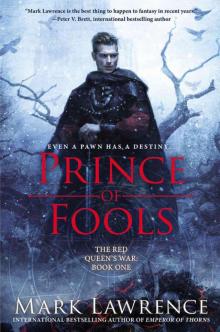 Prince of Fools
Prince of Fools Vodka Politics: Alcohol, Autocracy, and the Secret History of the Russian State
Vodka Politics: Alcohol, Autocracy, and the Secret History of the Russian State Holy Sister
Holy Sister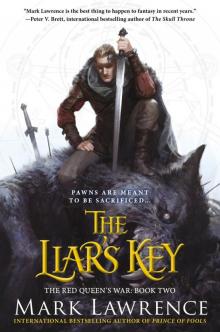 The Liar's Key
The Liar's Key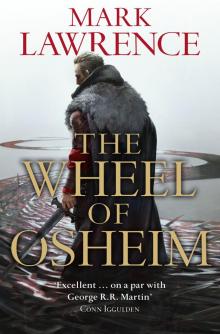 The Wheel of Osheim
The Wheel of Osheim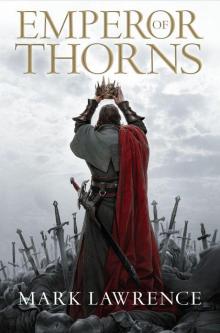 Emperor of Thorns
Emperor of Thorns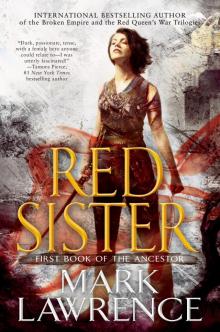 Red Sister
Red Sister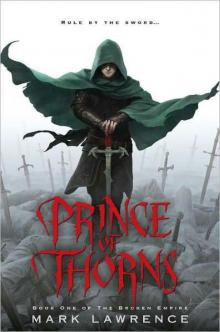 Prince of Thorns
Prince of Thorns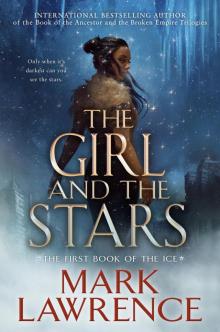 The Girl and the Stars
The Girl and the Stars Dispel Illusion (Impossible Times)
Dispel Illusion (Impossible Times)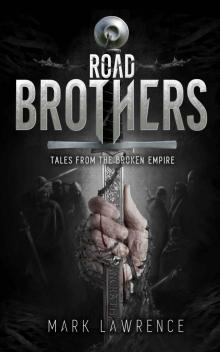 Road Brothers
Road Brothers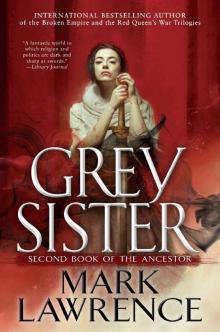 Grey Sister
Grey Sister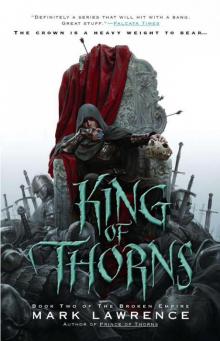 King of Thorns
King of Thorns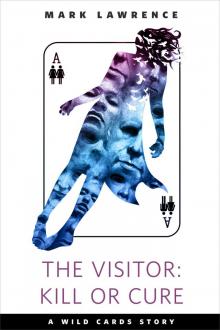 The Visitor--Kill or Cure--A Tor.com Original
The Visitor--Kill or Cure--A Tor.com Original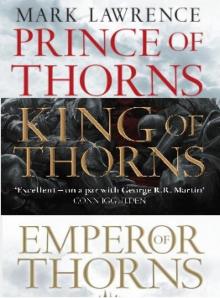 The Broken Empire Trilogy Omnibus
The Broken Empire Trilogy Omnibus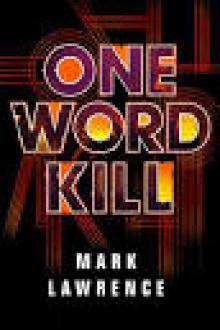 One Word Kill (Impossible Times Book 1)
One Word Kill (Impossible Times Book 1)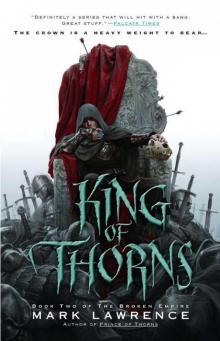 King of Thorns be-2
King of Thorns be-2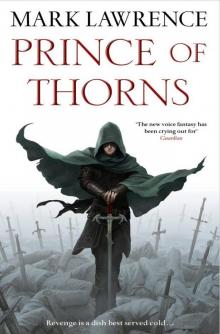 Prince of Thorns tbe-1
Prince of Thorns tbe-1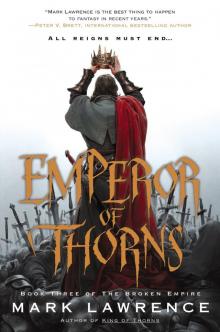 Emperor of Thorns tbe-3
Emperor of Thorns tbe-3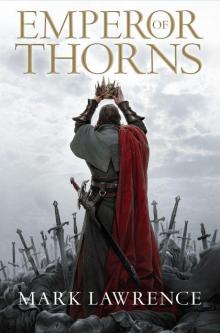 Emperor of Thorns (The Broken Empire, Book 3)
Emperor of Thorns (The Broken Empire, Book 3)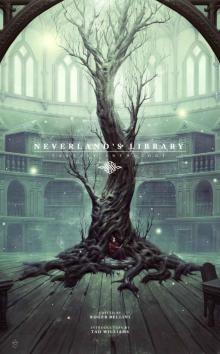 Neverland's Library: Fantasy Anthology
Neverland's Library: Fantasy Anthology